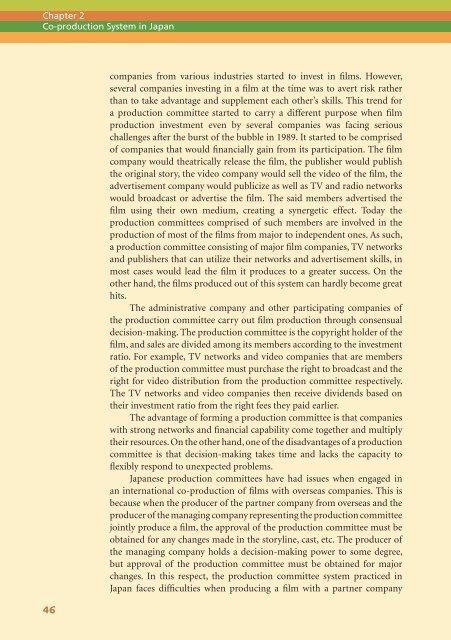The Guide to Japanese Film Industry & Co -Production - UNIJAPAN
The Guide to Japanese Film Industry & Co -Production - UNIJAPAN
The Guide to Japanese Film Industry & Co -Production - UNIJAPAN
You also want an ePaper? Increase the reach of your titles
YUMPU automatically turns print PDFs into web optimized ePapers that Google loves.
Chapter 2<br />
<strong>Co</strong>-production System in Japan Development of <strong>Co</strong>-production System and Its Structure<br />
companies from various industries started <strong>to</strong> invest in films. However,<br />
several companies investing in a film at the time was <strong>to</strong> avert risk rather<br />
than <strong>to</strong> take advantage and supplement each other’s skills. This trend for<br />
a production committee started <strong>to</strong> carry a different purpose when film<br />
production investment even by several companies was facing serious<br />
challenges after the burst of the bubble in 1989. It started <strong>to</strong> be comprised<br />
of companies that would financially gain from its participation. <strong>The</strong> film<br />
company would theatrically release the film, the publisher would publish<br />
the original s<strong>to</strong>ry, the video company would sell the video of the film, the<br />
advertisement company would publicize as well as TV and radio networks<br />
would broadcast or advertise the film. <strong>The</strong> said members advertised the<br />
film using their own medium, creating a synergetic effect. Today the<br />
production committees comprised of such members are involved in the<br />
production of most of the films from major <strong>to</strong> independent ones. As such,<br />
a production committee consisting of major film companies, TV networks<br />
and publishers that can utilize their networks and advertisement skills, in<br />
most cases would lead the film it produces <strong>to</strong> a greater success. On the<br />
other hand, the films produced out of this system can hardly become great<br />
hits.<br />
<strong>The</strong> administrative company and other participating companies of<br />
the production committee carry out film production through consensual<br />
decision-making. <strong>The</strong> production committee is the copyright holder of the<br />
film, and sales are divided among its members according <strong>to</strong> the investment<br />
ratio. For example, TV networks and video companies that are members<br />
of the production committee must purchase the right <strong>to</strong> broadcast and the<br />
right for video distribution from the production committee respectively.<br />
<strong>The</strong> TV networks and video companies then receive dividends based on<br />
their investment ratio from the right fees they paid earlier.<br />
<strong>The</strong> advantage of forming a production committee is that companies<br />
with strong networks and financial capability come <strong>to</strong>gether and multiply<br />
their resources. On the other hand, one of the disadvantages of a production<br />
committee is that decision-making takes time and lacks the capacity <strong>to</strong><br />
flexibly respond <strong>to</strong> unexpected problems.<br />
<strong>Japanese</strong> production committees have had issues when engaged in<br />
an international co-production of films with overseas companies. This is<br />
because when the producer of the partner company from overseas and the<br />
producer of the managing company representing the production committee<br />
jointly produce a film, the approval of the production committee must be<br />
obtained for any changes made in the s<strong>to</strong>ryline, cast, etc. <strong>The</strong> producer of<br />
the managing company holds a decision-making power <strong>to</strong> some degree,<br />
but approval of the production committee must be obtained for major<br />
changes. In this respect, the production committee system practiced in<br />
Japan faces difficulties when producing a film with a partner company<br />
from overseas. For example, in Korea and China the direc<strong>to</strong>r on the set has<br />
a strong decision-making power, or in Europe and the US the producer has<br />
a strong decision-making power.<br />
46 47




